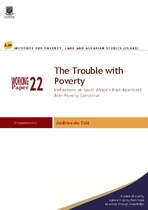| dc.contributor.author | du Toit, Andries | |
| dc.date.accessioned | 2019-03-11T11:31:59Z | |
| dc.date.available | 2019-03-11T11:31:59Z | |
| dc.date.issued | 2012-09 | |
| dc.identifier.citation | Du Toit A (2012) 'The trouble with poverty: Reflections on South Africa’s post-apartheid anti-poverty consensus ', Working Paper 22. PLAAS, UWC: Bellville. | en_US |
| dc.identifier.uri | http://hdl.handle.net/10566/4484 | |
| dc.description.abstract | This paper considers the state of poverty discourse in South Africa since 1994: the ideological frameworks,
narratives and assumptions that have shaped the construction of poverty as an object of academic
knowledge, policy management and political concern. One of the distinctive characteristics of post-Apartheid South African politics is the existence of a broad consensus both on the importance of the need to
reduce poverty and the means by which to do it. This consensus has a paradoxical and ambiguous
character. On the one hand, ‘poverty talk’ plays a central role in posing and framing fundamental questions
of social justice in South Africa: indeed, it is one of the main ways in which the issue of the moral and
political legitimacy of the post-Apartheid social order is framed and debated. This has facilitated significant
and broad social legitimacy for ‘pro-poor' policies and the distribution of resources. But at the same time,
the discursive frameworks that have underpinned this consensus also contain important limitations.
Poverty is understood in ways that disconnect it from an understanding of inequality and social process,
and which deny consequence or relevance to the causal relationship between the persistence of poverty
and the formation and nature of South African capitalism. In this way 'poverty talk' trivialises poverty as a
social issue and neutralises its political charge. The paper ends with an evaluation of the strengths and
limits of South Africa’s anti-poverty consensus and considers different responses to the impasses
confronting poverty management | en_US |
| dc.language.iso | en | en_US |
| dc.publisher | Institute for Poverty, Land and Agrarian Studies, University of the Western Cape | en_US |
| dc.relation.ispartofseries | Working Paper;22 | |
| dc.subject | Poverty | en_US |
| dc.subject | Discourse | en_US |
| dc.subject | Inequality | en_US |
| dc.subject | South African politics | en_US |
| dc.title | The trouble with poverty: Reflections on South Africa’s post-apartheid anti-poverty consensus | en_US |
| dc.type | Working Paper | en_US |

